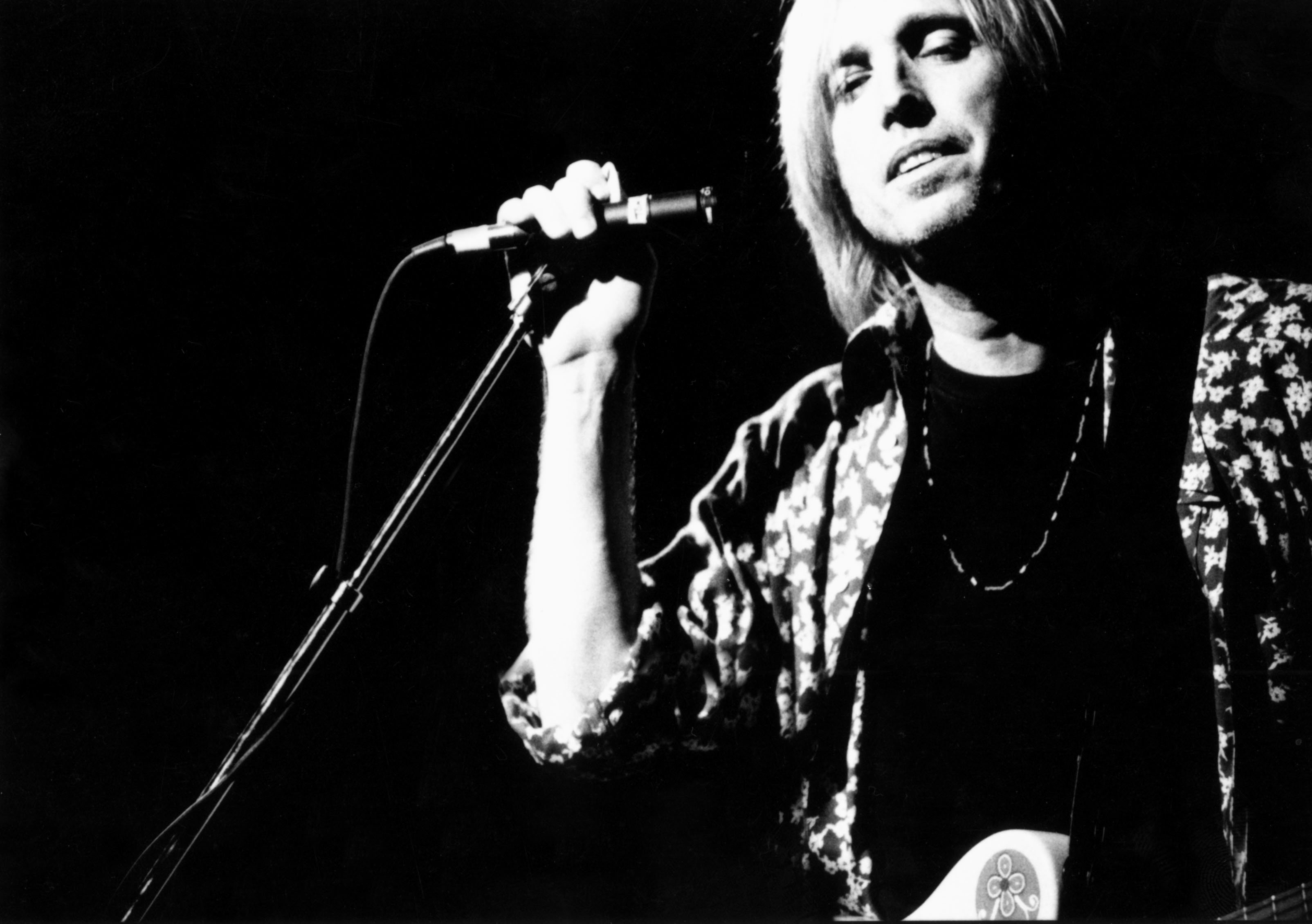Remembering Tom Petty, the musician who made America smile
He created a universal, authentic, and accessible rock and roll experience that made you feel just a little less alone


A free daily email with the biggest news stories of the day – and the best features from TheWeek.com
You are now subscribed
Your newsletter sign-up was successful
It's difficult to name any artists that had monster pop relevance in each of the musically and culturally seminal years of 1976, 1985, 1989, and 1994, but Tom Petty can boast such a claim. He was rock and roll's last great angry hippie, singing about peace and love while pumping fists of rage at the same time. He died Monday night at the age of 66, and will be remembered as one of rock's most prolific hitmakers.
Petty created straight, unpretentious rock and roll that was always of its time. With wispy blonde hair draped over a hang dog expression, he was lyrically inventive, a living jukebox of earworm catchy melodies. He and his Heartbreakers were a rock and roll force for 40 years — an anniversary they celebrated with a tour of packed arenas concluding at the Hollywood Bowl just 2 weeks ago.
Though he might be best associated with the jangly roots rock anthem "American Girl" or the tongue-in-cheek ballad that eventually became legally required to play at every graduation party for the rest of time, "Free Fallin'" — he's also the mad genius behind the hypnotic and very 1980s synth-and-drum machine-sounding ode to a bad breakup, "Don't Come Around Here No More."
The Week
Escape your echo chamber. Get the facts behind the news, plus analysis from multiple perspectives.

Sign up for The Week's Free Newsletters
From our morning news briefing to a weekly Good News Newsletter, get the best of The Week delivered directly to your inbox.
From our morning news briefing to a weekly Good News Newsletter, get the best of The Week delivered directly to your inbox.

The visually surreal Alice in Wonderland in Hell-themed video for "Don't Come Around…" could arguably be described as the beginning of Petty's second act, when the fury of "Refugee" and the hopefulness of "Even the Losers" gave way to a sound that was weird, surreal, and even funny. The video also marked Petty as an MTV pioneer, much like Michael Jackson, an artist who understood the potential in treating his videos as standalone works of art, rather than the mostly ephemeral lip-synched promotional videos they had been earlier.
In addition to "Free Fallin'," the videos for "Runnin' Down a Dream" (where an animated Petty is the star of his own storybook adventure) and "Mary Jane's Last Dance" (where the rocker spends one last night with a dead Kim Basinger) would help Petty maintain his pop appeal to the CD-buying youth.
As the youngest member of the Traveling Wilburys — a short-lived supergroup of rock and roll royalty that included Roy Orbison, George Harrison, Bob Dylan, and Jeff Lynne — Petty's chorus harmonies helped bridge the gap between a croaking Dylan and a still pristine-throated Orbison. The Wilburys even scored two legit late '80s hits with "Handle with Care" and "End of the Line," both of which remain staples of classic rock radio rotations.
For my money, Petty's strongest and most cohesive records were his two "solo" albums (even though most of the Heartbreakers would contribute performances to both). On 1989's Full Moon Fever, Petty wears his influences on his sleeve, with his cover of Del Shannon's "Feel a Whole Lot Better" making it plain where he developed his writing style of pretty-sounding songs sung by angry, betrayed dudes. The album also includes the mocking ode to '80s yuppiedom "Yer So Bad," and "I Won't Back Down" — perhaps the most laid back-sounding statement of resolute defiance in the rock and roll canon and the source of one of the most memorable moments in the televised 9/11 benefit concert "America: A Tribute to Heroes."
A free daily email with the biggest news stories of the day – and the best features from TheWeek.com
But it was 1994's Wildflowers where Petty was able to channel the sum of his best parts into one relatively long record, loaded front-to-back with re-listenable tunes. The title track is so airy and romantic you'd think Petty was channeling Brian Wilson. "You Wreck Me" is a throwback rocker worthy of the Heartbreakers. And "You Don't Know How it Feels" is every lonely stoner's "feel good about feeling bad" go-to track. Though Petty was in his 40s at the time, his new material still held commercial appeal, in part because he caught the MTV "Unplugged"-inspired wave of stripped down production — as well as a growing taste for very loosely-defined "roots rock" — in its ascendance.
Though Petty never had as big a commercial or critical success after Wildflowers, he still regularly recorded new albums and toured to sold out venues for more than two decades. He and the Heartbreakers even provided a weird, eclectic, and very Petty set of songs (including Beck and Lucinda Williams covers) to the Edward Burns-directed romantic comedy She's the One.
Musical acts don't last four decades without developing a fanatical following, but there are no Petty-heads following the Heartbreakers around in VW buses. Like the artist himself, known for writing and recording his classic-laden discography in quick, no-frills fashion, Petty fans are there for the show, not any scene.
While Full Moon Fever was one of the first CDs I bought with my paper route money more than a quarter century ago, I never saw Petty live until this past summer. As he cranked through two hours of hits (with so many available he never quite got to them all), I noticed that pretty much everyone in the Forest Hills Stadium crowd was not only singing along to every word, but they were smiling. That was Petty's gift, bringing out a universal, authentic, and accessible rock and roll experience that made you feel just a little less alone.
He was a soft-spoken Southerner who adopted L.A. as home and was just as influenced by the weirdos on Ventura Boulevard as he was by the harmonies of The Byrds. He was an angry, loud, guitar rocker who never quite went punk. He was a video vanguard who still put the music first. He hid a bilious bite behind a warm Florida drawl. He may not have re-invented the rock and roll wheel, but he had an uncanny ability to reach audiences over generations.
Tom Petty's was a rock and roll heart — defiant and romantic and sensitive and well-equipped to blare out of a car stereo's speakers with the windows down on a summer night.
Anthony L. Fisher is a journalist and filmmaker in New York with work also appearing at Vox, The Daily Beast, Reason, New York Daily News, Huffington Post, Newsweek, CNN, Fox News Channel, Sundance Channel, and Comedy Central. He also wrote and directed the feature film Sidewalk Traffic, available on major VOD platforms.
-
 The environmental cost of GLP-1s
The environmental cost of GLP-1sThe explainer Producing the drugs is a dirty process
-
 Greenland’s capital becomes ground zero for the country’s diplomatic straits
Greenland’s capital becomes ground zero for the country’s diplomatic straitsIN THE SPOTLIGHT A flurry of new consular activity in Nuuk shows how important Greenland has become to Europeans’ anxiety about American imperialism
-
 ‘This is something that happens all too often’
‘This is something that happens all too often’Instant Opinion Opinion, comment and editorials of the day
-
 Walter Isaacson's 'Elon Musk' can 'scarcely contain its subject'
Walter Isaacson's 'Elon Musk' can 'scarcely contain its subject'The latest biography on the elusive tech mogul is causing a stir among critics
-
 Welcome to the new TheWeek.com!
Welcome to the new TheWeek.com!The Explainer Please allow us to reintroduce ourselves
-
 The Oscars finale was a heartless disaster
The Oscars finale was a heartless disasterThe Explainer A calculated attempt at emotional manipulation goes very wrong
-
 Most awkward awards show ever?
Most awkward awards show ever?The Explainer The best, worst, and most shocking moments from a chaotic Golden Globes
-
 The possible silver lining to the Warner Bros. deal
The possible silver lining to the Warner Bros. dealThe Explainer Could what's terrible for theaters be good for creators?
-
 Jeffrey Wright is the new 'narrator voice'
Jeffrey Wright is the new 'narrator voice'The Explainer Move over, Sam Elliott and Morgan Freeman
-
 This week's literary events are the biggest award shows of 2020
This week's literary events are the biggest award shows of 2020feature So long, Oscar. Hello, Booker.
-
 What She Dies Tomorrow can teach us about our unshakable obsession with mortality
What She Dies Tomorrow can teach us about our unshakable obsession with mortalityThe Explainer This film isn't about the pandemic. But it can help viewers confront their fears about death.
